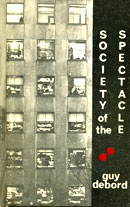

|
|

Society of the Spectacle
Debord, Guy
http://www.bopsecrets.org/SI/debord/index.htmhttp://www.connexions.org/CxArchive/BoPS/SI/debord/index.htm Date Written: 1967-01-01 Year First Published: 1967 Year Published: 2005 Pages: 90pp Dewey: 301.2 Resource Type: Book Cx Number: CX6572 An analysis of modern society and how it can be changed, written in the form of 221 theses. The first thesis reads: "In societies dominated by modern conditions of production, life is presented as an immense accumulation of spectacles. Everything that was directly lived has receded into a representation." Translator Ken Knabb describes the book as "an effort to clarify the nature of the society in which we find ourselves and the advantages and drawbacks of various methods for changing it. Every single thesis has a direct or indirect bearing on issues that are matters of life and death." Abstract: According to Debord: "The spectacle presents itself simultaneously as society itself, as a part of society, and as a means of unification. As a part of society, it is the focal point of all vision and all consciousness. But due to the very fact that this sector is separate, it is in reality the domain of delusion and false consciousness: the unification it achieves is nothing but an official language of universal separation." (thesis 3). "The development of productive forces is the unconscious history that has actually created and altered the living conditions of human groups - the conditions enabling them to survive and the expansion of those conditions. It has been the economic basis of all human undertakings. Within natural economies, the emergence of a commodity sector represented a surplus survival. Commodity production, which implies the exchange of varied products between independent producers, tended for a long time to retain its small-scale craft aspects, relegated as it was to a marginal economic role where its quantitative reality was still hidden. But whenever it encountered the social conditions of large-scale commerce and capital accumulation, it took total control of the economy. The entire economy then became what the commodity had already shown itself to be in the course of this conquest: a process of quantitative development. This constant expansion of economic power in the form of commodities transformed human labor itself into a commodity, into wage labor, and ultimately produced a level of abundance sufficient to solve the initial problem of survival - but only in such a way that the same problem is continually being regenerated at a higher level. Economic growth has liberated societies from the natural pressures that forced them into an immediate struggle for survival; but they have not yet been liberated from their liberator. The commodity's independence has spread to the entire economy it now dominates. This economy has transformed the world, but it has merely transformed it into a world dominated by the economy. The pseudonature within which human labor has become alienated demands that such labor remain forever in its service; and since this demand is formulated by and answerable only to itself, it in fact ends up channeling all socially permitted projects and endeavors into its own reinforcement. The abundance of commodities - that is, the abundance of commodity relations - amounts to nothing more than an augmented survival." (thesis 40) "The self-emancipation of our time is an emancipation from the material bases of inverted truth. This "historic mission of establishing truth in the world" can be carried out neither by the isolated individual nor by atomized and manipulated masses, but only and always by the class that is able to dissolve all classes by reducing all power to the de-alienating form of realized democracy - to councils in which practical theory verifies itself and surveys its own actions. This is possible only when individuals are "directly linked to universal history" and dialogue arms itself to impose its own conditions." (thesis 221) Table of Contents I. Separation Perfected II. Commodity As Spectacle III. Unity And Division Within Appearance IV. The Proletariat As Subject And As Representation V. Time And History VI. Spectacular Time VII. The Organization Of Territory VIII. Negation And Consumption within culture IV. Ideology Materialized Subject Headings
|